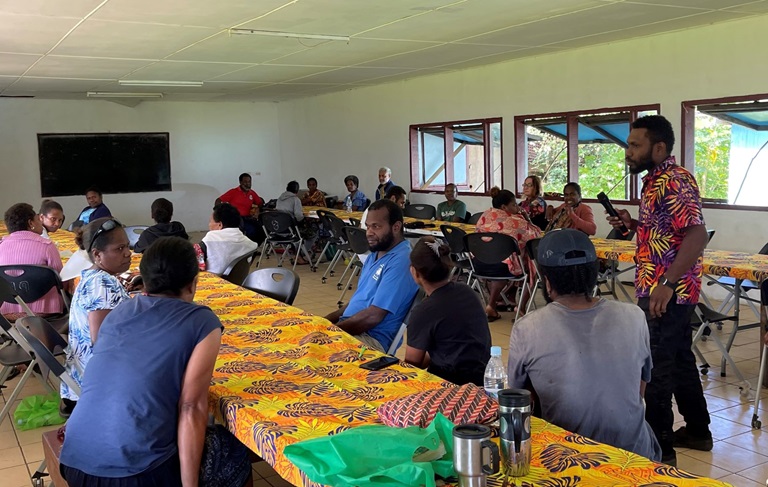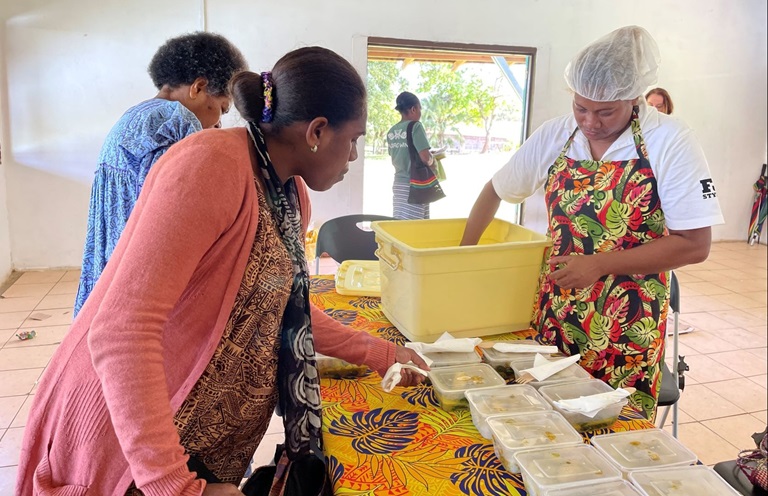Donning a hairnet and tropical-print apron, chef Emy Siro, age 40, prepares taro and rice at home in Huarere Studio, a neighbourhood in Port Vila, Vanuatu. With ladle in hand, she places individual portions in containers to sell for 250 VUV or US$ 2, as
part of her small business. Prior to starting her small food business, Emy worked as a chef in schools and hotels in the country; but like many food handlers in the country, she never had formal food safety training.
In 2017, Emy enrolled in a food safety training provided by the Vanuatu Ministry of Health aimed at certifying all food handlers in the country and reducing high rates of foodborne illness among the population. In 2016, nearly 14 000 cases of diarrhoea
cases were reported in the country, often due to consuming contaminated foods.
To conduct the trainings, the Ministry of Health translated WHO’s “Five keys to safer food manual” into Bislama, the local language of Vanuatu,
which teaches food handlers how to keep clean, separate raw and cooked food, cook thoroughly, keep food at safe temperatures, and use safe water and raw materials. In addition to the 5 keys, participants also learn about how to implement
the country’s food act and food regulations.
“I started the training because I knew food safety was important to us in Vanuatu and wanted to learn more about the timing of selling of food,” says Emy. “For example, I didn’t know it was not safe to keep food at room temperature longer than two hours. That was something I learnt from attending the training.”
Under Vanuatu’s Food Control Act and Food Regulation, food handlers must hold a valid food safety certificate to enable them to sell quality healthy ready-to-eat food to the public. To enforce this regulation, the 3-day food safety trainings provide a food safety certificate after completion of the course, which is valid for 2 years. Food businesses also cannot get a permit without have a food safety certificate.

A food safety training being conducted for 45 food handlers in Port Vila, Vanuatu. WHO/Tsogy Banyandorj
“Before the training, we observed the conditions of the food handlers and found that many did not conform to the minimum requirements for food handling, such as washing hands or separating raw and cooked food,” said Nellie Wouloseje, manager
of the Environmental Health Unit, Public Health Department, Vanuatu Ministry of Health. “After training, people started to have the basic principles of food handling, such as using a head cap.”
Since 2017, the government has trained and certified more than 4500 food handlers in all 6 provinces of the country. Today, most food handlers are now wearing gloves and hair guards, serving their food with tongs, and covering it with foil or cling wrap. As a result, foodborne illnesses have been decreasing. In 2019, diarrhoea cases reported in Vanuatu dropped to less than 8000.
After completing the food safety training, Emy became part of a group of “Mamas” or local women chefs who trained for 6 months on cooking skills and now work together to manage “Island Mama’s Cuisine”, a food business out of Alliance Françoise in Port Vila, the capital of Vanuatu.

Emy selling her pre-packaged cooked food during a food safety training. WHO/Tsogy Banyandorj
“I saw the importance of this training for other mamas in the country, and encouraged our members of parliament and provincial councillors to sponsor the food safety training fees for more mamas to attend,” said Emy. “I now assist the
health department to raise awareness of food safety to mamas in my community.”
This is an inspiring approach in Vanuatu introduced by the Ministry of Health of Vanuatu to show a joint responsibility of the Government and food handlers in their journey to strengthen the Vanuatu food safety system from ‘farm to plate’,
said Dr Eunyoung Ko, country liaison officer, WHO Vanuatu.
The food safety training sessions are open to people who manage roadside food stalls, street food vendors or those working in schools, hotels and restaurants. The Ministry of Health continues to offer trainings to women, who sell cooked food in roadside
food stalls.
To ensure compliance with food safety measures, the government also monitors food establishments on an ad-hoc basis or when there is a food compliant. In the future, the Ministry of Health plans to further improve compliance by developing different enforcement plans for a variety of food establishments.




